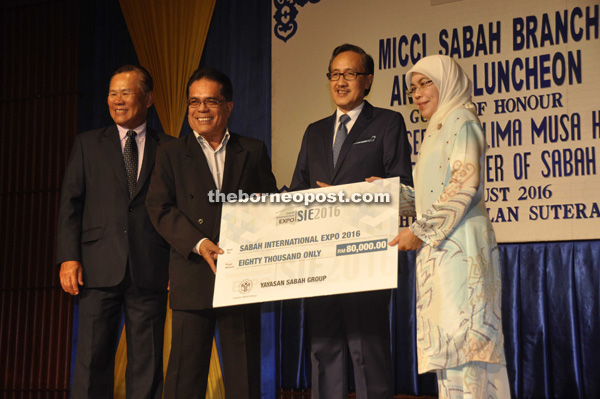
Masidi (second right) witnessing the presentation of sponsorship to SIE organising chairman Datuk Mohd Basri Abdul Gafar, from Yayasan Sabah deputy director Rosmawati Lasuki. Also present is MICCI Sabah branch chairman Datuk CK Tan.
KOTA KINABALU: The economic fundamentals of the State are still strong and remain on the right track, said Chief Minister Datuk Seri Musa Aman.
Undeniably, there are still many development efforts that need to be improved for the benefit of the people in this State, particularly in the context of socio-economic and infrastructure development as well as basic amenities, he said.
He added that the Barisan Nasional (BN), which currently administers the State, has always endeavoured to implement policies, projects and programmes that are beneficial for the wellbeing of the community, in particular, and the State in general.
Musa pointed this out in his speech for the Malaysian International Chamber of Commerce and Industry (MICCI) Sabah Chapter’s annual luncheon. It was delivered by Tourism, Culture and Environment Minister Datuk Seri Panglima Masidi Manjun.
He disclosed that the State’s economy remains resilient and was less affected than what had been anticipated earlier. Despite the sharp fall in prices of crude petroleum, he said the export volume of crude petroleum had increased by 45.3 per cent to reach RM10.4 billion in the first eight months of 2015 as compared to the same period in 2014.
The State’s economic growth for 2016 is projected to be moderate at around 3.5 to 4.5 percent, he said, adding that even though the rate of economic growth is somewhat slowing down in Asia and globally, the State’s economic fundamentals still remained strong, due to our wealth of natural resources such as crude oil, palm oil and forest products that are still in great demand in the world market.
Sabah’s total external trade in 2015 was RM71 billion, comprising RM40.8 billion in exports and RM30.2 billion in imports. Sabah’s five largest export markets in 2015 were India (RM7.5 billion), China (RM3.5 billion), Australia (RM1.7 billion), Singapore (RM1.71 billion) and USA (RM1.67 billion). Her five main sources of imports the same year were Singapore (RM2.78 billion), China (RM2.53 billion), USA (RM1.36 billion), Germany (RM304 million) and Australia (RM278.5million), he said.
According to him, the State government, through the Department of Industrial Development and Research under the Ministry of Industrial Development, had been carrying out programmes to encourage export of Sabah SMEs products.
“In 2015, about 40 companies had benefited from this programme and I am sure many of you here were among the beneficiaries. Total value of this Sabah-made products exported through this programme in 2015 was RM11.23 million.
“During the 10th Malaysia Plan (10MP) period, the manufacturing sector received a total investment of RM12.7 billion. For the first quarter of 2016 alone, Sabah had received a total investment of RM1.69 billion with 3,907 employment opportunities. This has placed Sabah at the top of the list of investments received in Malaysia,” he said.
“I am also glad to hear that the Ninth Sabah International Expo (SIE) 2016 is just around the corner. I was briefed by the organizing committee that all booths had been taken up and there are 20 countries’ representatives attending this auspicious event.
“On behalf of the State government, I would like to thank all of you for your efforts. I would also like to assure you that you can count on the continued support of the State government,” Musa said.
On the MICCI Sabah Chapter’s annual luncheon, he said it is an opportunity for the State government to interact with the business community and to learn about their sentiments and concerns.
These luncheons also provide a good platform for the government to share with the private sector the state’s economic performance, aspirations and developments goals, he added.
